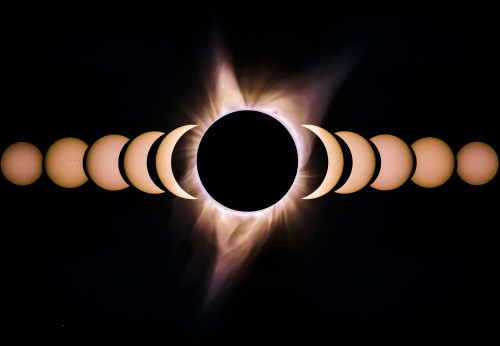A new case study from ophthalmology researchers reveals what can happen if you look at a solar eclipse—plus, NASA's guidance on how to observe an eclipse safely.
It might seem like the moon’s passage with the sun would make eye protection unnecessary during an eclipse, but March 2024 research led by a medical doctor of ophthalmology and published in Journal Francais d’Ophtalmologie reveals what can happen if you look at a solar eclipse without protection.
BREAKING: Revolutionary Skin Serum That's Taking The Nation by Storm
Experts say the April 8, 2024 eclipse will be observable across Mexico, the United States, and Canada. During this extraordinary event, the moon will pass in front of the sun, creating a striking spectacle in the daytime sky. In light of the enthusiasm, three medical researchers in Morocco urge viewers to take precautions to avoid long-term damage from the eclipse’s harmful rays.
What can happen if you look at a solar eclipse, from expert doctors
This research documents what the scientists call “the toxic effects of the interaction between light and the eye” based on clinical cases of solar retinopathy from watching a solar eclipse.
Solar retinopathy occurs when the retina, which is the part of the eye that detects light and communicates with the brain, gets damaged by direct sunlight. This type of harm can result from watching a solar eclipse without the safety of protective glasses, potentially causing “serious and irreversible” damage to your vision according to the research team.
The damage is attributed to a photochemical injury, which occurs when the intense solar light triggers chemical reactions harmful to the eye. One example from the research is a man now in his forties who, at age 16, viewed an eclipse for 15 minutes with no eye protection. While his left eye eventually healed, for decades he has continued to suffer from problems in his right eye, such as difficulties in focusing sharply and persistent discomfort. These issues can significantly interfere with crucial daily tasks, including reading and driving.
While there’s no cure for solar retinopathy, it’s important to consult an ophthalmologist if you notice any vision problems following a solar eclipse. Recovery is possible within three to six months for many individuals, yet some may face permanent vision impairment.
Ahead, learn how to safely look at a solar eclipse without harming your eyes now or in the future.
How to protect yourself during the solar eclipse?
Keep safe and enjoy the event by sticking to NASA‘s instructions for looking at a solar eclipse:
- Eclipse glasses and solar viewers: To safely observe the sun during the partial phases that occur before and after the total eclipse, use eclipse glasses or a handheld solar viewer. These tools are specifically designed to filter out harmful sunlight, allowing you to look at the sun without risking eye damage.
- Viewing during totality: There’s a moment during the eclipse known as “totality,” when the moon fully covers the sun, plunging the day into a twilight state. It is only during these brief minutes that you can safely view the eclipse without any protective eyewear. You’ll know this phase has arrived when the sun’s bright disk is completely hidden, and no sunlight is visible through your eclipse glasses or viewer.
TRENDING: Boost Your Memory With This Easy Trick
- Transitioning out of totality: As totality comes to an end, and even the slightest sliver of the sun begins to shine through, it’s imperative to immediately equip your eclipse glasses or solar viewer again. This precaution is essential to avoid the sudden exposure to the intense sunlight, which can cause eye damage in just a fraction of a second.
- Protecting your skin: While much emphasis is placed on eye safety during an eclipse, skin protection is equally important. The sun’s ultraviolet rays can be just as harmful during an eclipse as on any sunny day. If you plan to be outdoors watching the eclipse unfold over several hours, applying sunscreen, donning a hat, and wearing protective clothing are key steps to shield your skin from UV damage.








